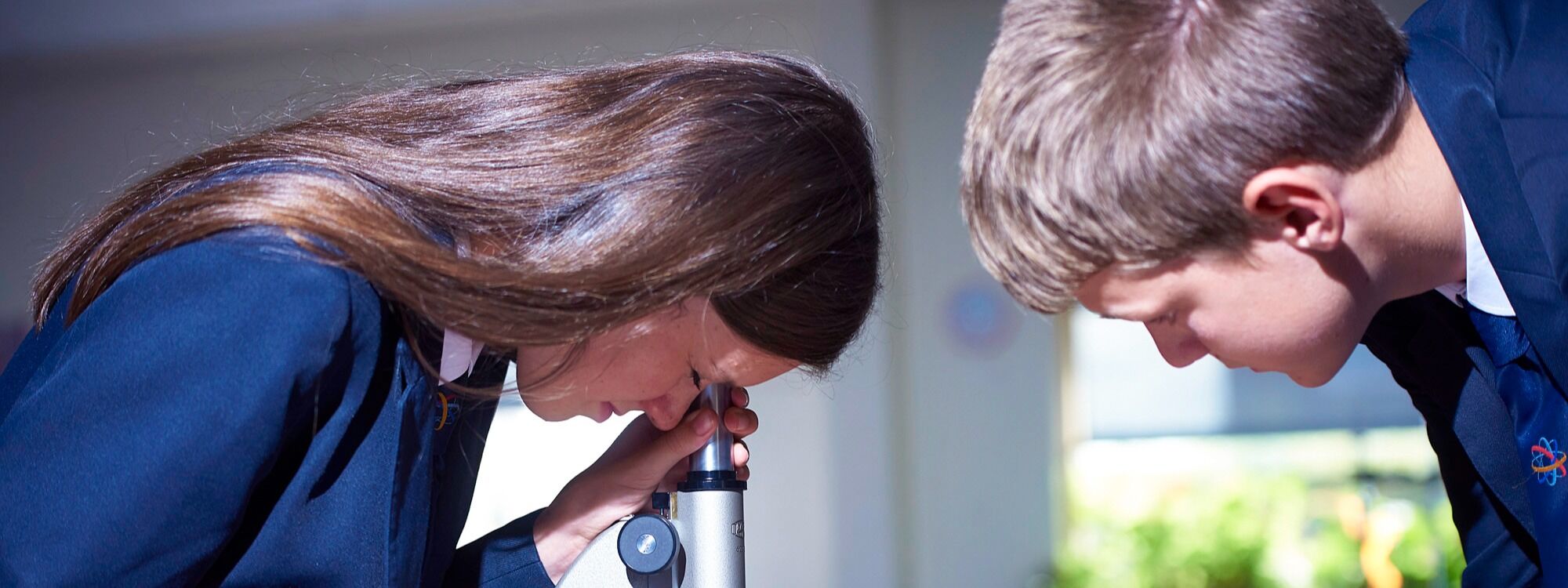Science
BackScience Curriculum Intent
“Our specialist team of scientists will work with students to actively engage in all 3 disciplines of science covering both the National Curriculum and topics extra to that.”
Curriculum Aim
Building on the foundation of primary school the specialist team of scientists will work with students to actively engage in all 3 disciplines of science covering both the National Curriculum and topics extra to that. This will be a combination of both substantive knowledge but also the science disciplinary knowledge that is a key part of all sciences.
Practical work is a key part of the learning, using our well resourced laboratories, as purposeful practicals enhance students' understanding. Literacy and numeracy within science will be key in the collaborative approach to inspiring students with an understanding and love for science.
Key stage 3 Learning Journey
During Key Stage 3 students are introduced to key concepts in all 3 science disciplines. The concepts have been sequenced to start students with concrete ideas about the world around them that they go on to apply in future units. Students are challenged to use their essential knowledge to apply to unfamiliar contexts and to explain practical work. Skills around literacy, data analysis, practical work and how the science applies to their life run throughout all of Key Stage 3. Throughout Key Stage 3 consolidation and retrieval practice skills are embedded to ensure a firm grasp of the essential knowledge and prepare students for the GCSE Science course.
Assessment
Students are assessed throughout the units of work using low stakes activities and homeworks. At the end of the unit students sit a short multiple choice quiz . Using teacher marked checkpoint questions, practice skills and hinge knowledge, these are then used to inform work at the beginning of future lessons and homeworks.
Student Tracking exams (STs) are carefully prepared for to ensure pupils know how to revise over a longer period of time. They cover all topics taught that year as well as skills and knowledge that are revisited throughout all topics.
Key stage 4 Learning Journey
Students will explore biology, chemistry and physics in detail and will be well prepared for A-level sciences or STEM related college courses. Students can opt to take triple science or combined science GCSEs.
GCSE Combined Science: Trilogy (8464) is worth two GCSEs. The course covers aspects of Biology, Chemistry and Physics in equal amounts and allows progression onto A-levels in any of the three Sciences or Separate Science GCSE Biology (8461), GCSE Physics (8463), GCSE Chemistry (8462). Each course is a separate GCSE in its own right, including the relevant science content from GCSE Combined Science, plus half as much again. These three courses are designed to be first and foremost a springboard to A-levels in the Sciences and any student seriously considering Science A-levels should carefully consider opting for this triplet of courses.
Assessment
Students will be assessed throughout the course using low stakes work in lessons, homework (including retrieval practice homework) and in end of module assessments. This will be used to target further work in subsequent lessons. At the end of Year 10 students will sit a mock paper on that years work (Paper 1 topics) and in Year 11 students will sit mocks in both Paper 1 and Paper 2 units. These will be used to identify topics for further teaching and revision both individually and across classes.
Additional to the Curriculum
- We have a Science Club from 3.15-4pm every Wednesday! Students complete CREST award tasks to earn nationally recognised qualifications. https://www.crestawards.org/ Please email Joanna.Ainsworth@macclesfieldacademy.org
- Revision Classes are on 3 mornings and 2 evenings, please speak to your teachers for more details
- Students in Year 9 will be using the Wonderdome to study astronomy and the impact of advances in scientific technology on our understanding of the world around us
- In Year 8 we will be taking part in the National Great Science Share in the spring/summer term
- Year 7 have a trip to Jodrell Bank in the summer term as part of their Space project work
- Students in Year 10 are involved in the National Scientific Thinking Challenge run by Warwick University, several students achieved Gold Awards in last years competition
- From Years 7-11 we encourage students to volunteer , demonstrate experiments and chat to parents and children during our open events.
- Throughout their time at school students will get the opportunity to attend university science events, meet and work with STEM ambassadors, take part in community science activities and competitions alongside targeted events such as ‘Girl’s Night Out’ at Jodrell Bank.
The Macclesfield Academy Science Department in the Community
We work with our local primary schools providing support with curriculum delivery and community science events. This year we invited primary school aged children from the local area to our ‘Science of fireworks’ lectures which proved very popular.
Later in the year we hosted the Wonderdome Astronomy Dome in the department which was a wonderful experience for our own students and those from local Primary schools.
Science Department Sharepoint Site
Subject Leader – Mrs Joanna AinsworthTeacher - Mrs Claire BedsonTeacher – Ms Kellie BrookTeacher - Ms Rebekah Coles
Teacher - Ms Sofia SalimTeacher – Dr Jenny SlaughterTeacher – Ms Victoria Tunney
Careers in Science
Science Stars
Each week, each teacher nominates a student as 'Star of the Week' for excellent effort, attitude and attainment. They then enter a half termly draw for a prize.
